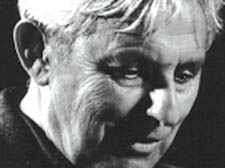|
|
 |
| |

Dennis Abse |
Lament of a lone swan
Gerry Isaaman praises poet Dannie Abse’s brilliant journal, written after the tragic loss of the love of his life
The Presence. By Dannie Abse. Hutchinson £15.99
SWANS mate for life, which is the obvious reason why an engraving of a solitary swan appears proudly on the front cover of Dannie Abse’s new book of mourning sadness.
It is the intimate and painful diary he wrote, more as a therapeutic drive to unblock his brain following the instant death of his art historian wife, Joan, in a traffic car crash two years ago. It was not intended for publication until others persuaded him otherwise.
A postscript poem to her at the end – “no solitary swan floats by from everlasting to everlasting” – pays testimony to their long and almost everlasting life together, as Dannie struggles on alone through a daily daze at his home in Golders Green.
It is not the first time he has used the swan as a symbol. In his poem Lachrymae, written after Joan’s loss, he wrote: “I went to her funeral/ cried/ I went home that was not home.” And he and ended it with the lines: “Now, solemn, I watch/ the spellbound moon again/ its gnostic clone drowned/ Hampstead’s rush-dark pond/ where a lone swan sings/ without a sound.”
At 83, the physician poet who has shared with us his early Welsh years and Jewish roots in prose, plays and autobiography, as well as poetry, now shares his overwhelming grief.
It is a brilliant journal of lament that evokes his struggling determination to live on, no matter the hurt still rattling raw in his crash-broken bones, and comforted too by the poets he loves – Hardy, Hughes, Cavafy and Pasternak. They share in phoenix-fashion the pages of The Presence, whose “then and now” structure allows him to wander wherever he wants.
Death is a patron of the arts, he once said on radio, adding: “He’s the enemy. Death is for other people.” How true it is.
But then Dannie has become the soothsayer, the sage whose wisdom is evident from his own experiences, a merry-go-round of memories that whirl through every page.
He proves too that the best diaries, notebooks, and memoranda are those filled with gentle jokes. And perhaps the Jews have more jokes than any other race because, without them, they could never survive their many holocausts over the centuries.
One admirer told him he wished he was a Jew, though Dannie was last in synagogue on his barmitzvah, because then he would know more jokes.
He tells one that Joan enjoyed about the bereaved Hettie Cohen who is unsure what to put in her late husband’s death notice in the local paper. Eventually, she wrote: “Abe Cohen dead,” only go be told she could a few more words without extra charge. So she rewrites the notice: “Abe Cohen dead. Volvo for sale.”
There are half-grasped stories too from his past, how he and Joan set up home together in Belsize Square; his medical training and his white-coated chest clinic days in Fitzrovia; his entry into Swiss Cottage café literary life with the likes of Nobel Prize-winning author Elias Canetti, now considered a bit of a snob, though Canetti’s influence still provides the title for Dannie’s disaster diary.
It evokes too his edge-of-showbiz life, meeting up with Spike Milligan, Maureen Lipman, Uri Geller and Jacqueline du Pre and publisher friend Jeremy Robson, who organised those pioneering poetry and jazz concerts at Hampstead town hall and elsewhere in which Dannie took part.
He rails about President Bush and Tony Blair over the misbegotten war in Iraq and Guantanamo Bay. Yet, as he has pointed out: “Human kind cannot bear very much reality. One of the reasons poetry exists is because it has to ask questions to which there is no answer. So there is the quest.”
There have always been new ones, such as the column he wrote for me at the Ham & High in 1984, to emulate George Orwell’s prophetic novel. It ended up as a book called Journals from the Ant Heap, which even won critical acclaim in far off New Zealand, such is Dannie’s ability to express what it is to be human, in greys and greens and bright vermilion.
And always with a myth, or local legend a joke is attached, just as when Steven Berkoff wrote his play Sit and Shiver a few years ago. It was based on the Hebrew word Shiva, which means seven days when the tragic loss of a relative is mourned by the family sitting on low chairs with the legs virtually cut off, relatives and friends coming to ease the pain by creating a cocoon of condolence that enables the bereaved to live on. “As I child I thought Sitting Shiva was Sit and Shiver,” Berkoff explained.
But, as Dannie now knows, having written the hardest and most poignant book of his life, the world is warming up. Undoubtedly, a little bit of it due to his remarkable poetry and prose that lives on to stir so many faltering hearts. |
| |
|
 |
|
| |
 |
|
 |
|



